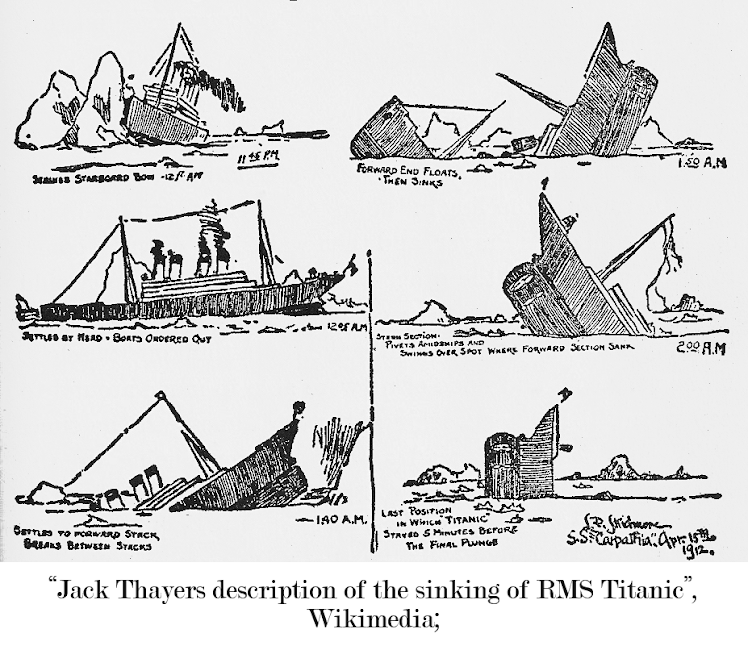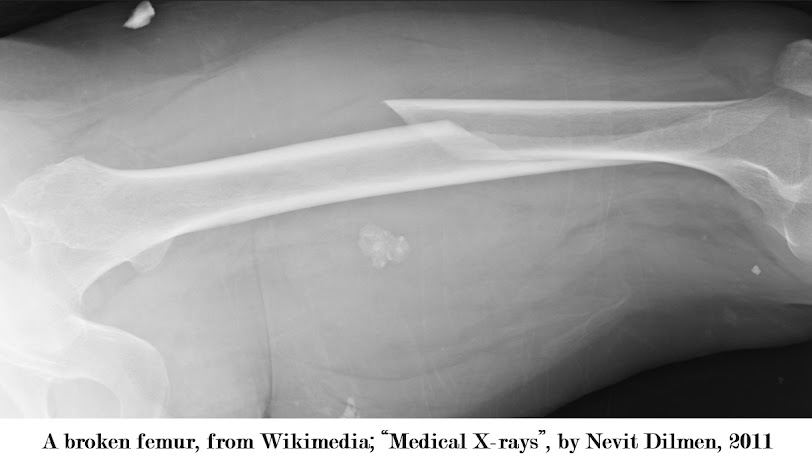Just over 114 years ago, on April 15th, 1912, the RMS Titanic sank and of the approximately 2,200 people aboard the ship when it wentdown, only 706 are known to have survived! Everyone knows that there were too few lifeboats to hold even half of the people onboard, but there were enough life jackets for everyone, so why did so many people die?
The
night the Titanic scraped its starboard side along the iceberg, the weather was
calm, clear, and colder than average for April in the north Atlantic. According to Third Officer Herbert J. Pitman,
the air temperature “...may have been 40 ... 35 to 40 [degrees
Fahrenheit or, 2 to 4 degrees Celsius]”1. When the Titanic sank, just two and a half hours
later at 2:20 am, plunging the survivors into the icy waters of the north
Atlantic, the temperature of the sea was about 28o F (-2.2o
C). This is below the freezing point of
fresh water, which freezes at 32o F (0o C), and was hovering
around the freezing point of seawater, since seawater freezes at about 28.4o
F (-2 o C), because of the salt in it.
According
to the testimony of both Second Officer C. H. Lightoller and Third Officer
Herbert J. Pitman, all the passengers had access to life vests and most of the
people who plunged into the water when the ship went down were wearing one.
The
only good news for the survivors, whether they were floating or swimming in the icy
waters of the north Atlantic, was that since the weather was described as calm, there was no wind and therefore no windchill.
But
the water was cold, cold, cold, and cold water can kill you quickly! As Second Officer C. H. Lightoller explained
in his book, Titanic and Other Ships, as he rode the stern of the ship
into the sea, “Striking the water was like a thousand knives being driven
into one’s body, and for a few moments I completely lost grip of myself and no
wonder, for I was perspiring freely, whilst the temperature of the water was
28º or 4º below freezing”3.
According
to the testimony of Third Officer Herbert J. Pitman, who was in Lifeboat No. 5,
three to four hundred yards away as the Titanic’s stern slipped below the
waves, that a chorus of “Crying, shouting, moaning” began “From the
water, after the ship disappeared” and continued “for about an hour”
before it “died away gradually”4.
And
an hour after the Titanic had disappeared forever below the surface, all of
those still in the water, except for Charles Joughin4, were dead,
not from drowning, but from the effects of the cold water.
The
Titanic was a tragedy but is there anything that we learn from the tragic
deaths of all those unfortunate people who died in the cold waters of the north
Atlantic on that April night, so long ago, something that could help us if we
ever end up in cold water?
Come back next week and read “How Long Would You Last? Part Two©”, HERE,
where we will talk about the lessons the Titanic victims can teach us about surviving
cold water.
I
hope that you continue to enjoy The Woodsman’s Journal Online and look for me
on YouTube at BandanaMan Productions for other related videos, HERE. Don’t forget to follow me on both The
Woodsman’s Journal Online, HERE,
and subscribe to BandanaMan Productions on YouTube. If you have questions, as always, feel free
to leave a comment on either site. I
announce new articles on Facebook at Eric Reynolds, on Instagram at
bandanamanaproductions, and on VK at Eric Reynolds, so watch for me.
That
is all for now, and as always, until next time, Happy Trails!
Notes
1 “United
States Senate Inquiry: Day 4 - Testimony of Herbert J. Pitman”, by the Titanic
Inquiry Project and “Weather maps from the night the Titanic sank”, by Jesse Ferrell.
2 “How
weather helped sink the Titanic”, by Blake Mathews and “Weather maps from the
night the Titanic sank”, by Jesse Ferrell.
3 “Second
Officer C.H. Lightoller – Sinking and Collapsible B”, by Titanic’s Officers.
4 “United
States Senate Inquiry: Day 4 - Testimony of Herbert J. Pitman”, by the Titanic
Inquiry Project.
Sources
Ferrell,
Jesse; “Weather maps from the night the Titanic sank”,
AccuWeather, April 12, 2022, https://www.accuweather.com/en/weather-blogs/weathermatrix/weather-maps-from-the-night-the-titanic-sank/1173542#:~:text=Although%20the%20weather%20itself%20didn,certainly%20contributed%20to%20the%20tragedy,
accessed April 27, 2024
Joiner, William C. SSGT;
“Cold Water Immersion”, Aerospace Safety, United States Air Force,
Volumes 34, Number 1, January 1978, page 6 to 7, https://books.google.com/books?id=BDf0AAAAMAAJ&newbks=1&newbks_redir=0&printsec=frontcover&pg=RA12-PA7&dq=water+chill+without+anti+exposure+suit&hl=en#v=onepage&q=water%20chill%20without%20anti%20exposure%20suit&f=false,
accessed April 24, 2024
Kalkomey Enterprises,
LLC; “Stages 1 and 2 of Cold Water Immersion”, [© 1998–2024], https://www.boat-ed.com/canada/studyGuide/Stages-1-and-2-of-Cold-Water-Immersion/10119902_114125/,
accessed April 27, 2024
Mathews,
Blake; “How weather helped sink the Titanic”, April 10, 2018, https://www.khou.com/article/news/local/how-weather-helped-sink-the-titanic/285-537036316#:~:text=The%20lookouts%20along%20with%20the,lethal%20temperature%20for%20any%20person,
accessed April 27, 2024
Navigation Center; “How
Large Was The Iceberg That Sank The Titanic”, U.S. Department of Homeland
Security, United States Coast Guard, https://web.archive.org/web/20140105034754/http://www.navcen.uscg.gov/?pageName=iipHowLargeWasTheIcebergThatSankTheTITANIC,
accessed April 27, 2024
Parchman, Greg, Capt.;
“So, Let Me Get This Straight-High Body Fat is a Good Thing?”, Approach,
Volume 41, Issue 2, March -April, 1996, page 18 to 20, https://books.google.com/books?id=LQNQRzJjOoQC&newbks=1&newbks_redir=0&printsec=frontcover&pg=PA20&dq=water+chill+without+anti+exposure+suit&hl=en#v=onepage&q=water%20chill%20without%20anti%20exposure%20suit&f=false,
accessed April 24, 2024
Titanic
Inquiry Project; “United States Senate Inquiry: Day 4 - Testimony of Herbert J.
Pitman”, [Copyright © 1998-2017: Titanic Inquiry Project], https://www.titanicinquiry.org/USInq/AmInq04Pitman03.php,
accessed April 27, 2024
Titanic’s Officers;
“Second Officer C.H. Lightoller – Sinking and Collapsible B”, © 2024
TitanicOfficers.com, https://www.titanicofficers.com/titanic_04_lightoller_08.html,
accessed April 27, 2024
United
State Coast Guard; “Cold Water Survival & Hypothermia–You May Not Know As
Much As You Think”, https://www.dco.uscg.mil/Portals/9/DCO%20Documents/5p/CG-5PC/CG-CVC/CVC3/notice/flyers/Cold_Water_Survival_Hypothermia.pdf,
accessed April 27, 2024
Wikimedia; “Jack Thayers
description of the sinking of RMS Titanic”, https://commons.wikimedia.org/wiki/File:Thayer-Sketch-of-Titanic.png,
accessed April 27, 2024
Wikimedia; “The iceberg
suspected of having sunk the RMS Titanic”, https://commons.wikimedia.org/wiki/File:Titanic_iceberg.jpg,
accessed April 27, 2024





















%20trimmed.jpg)
_-_Kitchener,_Ontario_2019-07-28%20trimmed.jpg)
%20trimmed.jpg)










